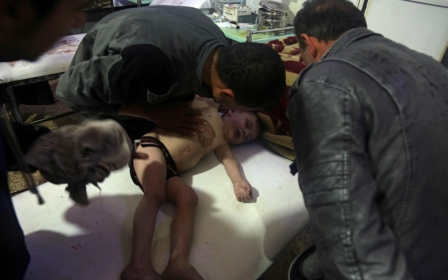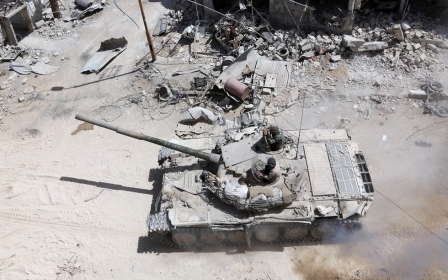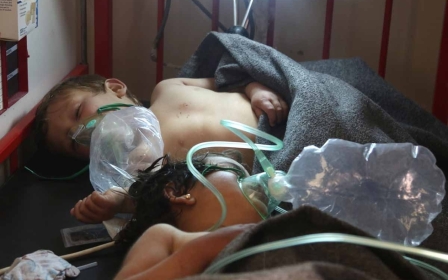Trump vows to hit Syria as Russia says it will target US launch sites

US President Donald Trump vowed on Wednesday to hit Syria, following Russian comments that any US missiles fired at Damascus would be shot down and launch sites targeted, in what appeared to be a major escalation of the chance of conflict between the two superpowers.
"Russia vows to shoot down any and all missiles fired at Syria. Get ready Russia, because they will be coming, nice and new and 'smart!' You shouldn’t be partners with a Gas Killing Animal who kills his people and enjoys it!," Trump tweeted.
His tweet was apparently in response to comments from Russia's ambassador to Lebanon, who said on Tuesday evening that any US missiles fired at Syria would be shot down and the launch sites targeted.
The Russian Foreign Ministry quickly replied that US "smart missiles" should be aimed at terrorists and not at the Syrian government.
"Smart missiles should fly towards terrorists, and not towards the lawful government which has been fighting international terrorism on its territory for several years," Maria Zakharova, spokeswoman for the Russian Foreign Ministry, wrote on Facebook.
Zakharova said that a possible US missile strike could be an attempt to destroy evidence of the alleged chemical weapons attack in Douma.
Russia's ambassador to Lebanon Alexander Zasypkin told Hezbollah's al-Manar TV on Tuesday: "If there is a strike by the Americans, then... the missiles will be downed and even the sources from which the missiles were fired."
He also said a clash "should be ruled out and therefore we are ready to hold negotiations".
A former British military commander on Wednesday said such action would mean Russia was "going to try and sink ships, sink submarines and shoot aircraft out of the sky - that's war."
On the ground in Syria on Wednesday, pro-Syrian government forces were emptying main airports and military bases over possible US strikes, according to the Syrian Observatory for Human Rights.
Zasypkin said his comments, broadcast on Tuesday evening, referred to a statement by his president, Vladimir Putin, and the Russian armed forces chief of staff. Zasypkin's comments were repeated on the state-funded broadcaster, RT.
If there is a strike by the Americans, then... the missiles will be downed and even the sources from which the missiles were fired
- Alexander Zasypkin
The Russian military said on 13 March that it would respond to any US strike on Syria, targeting any missiles and launchers involved in such an attack. Russia is the ally of the Syrian president, Bashar al-Assad.
Rallying allies
The US and its allies are considering whether to hit Syria over a poison gas attack in the town of Douma near Damascus on Saturday, which medical relief organisations said killed dozens of people.
Still, it is unclear whether the UK will join any planned strikes.
Trump discussed the crisis in Syria with Turkish President Recep Tayyip Erdogan during a telephone conversation late on Wednesday, a Turkish presidential source said.
Erdogan and Trump "exchanged views on the latest developments in Syria," the source added, without providing further details.
British Prime Minister Theresa May is ready to give the go-ahead for Britain to take part in military action in response to a suspected chemical weapons attack in Syria, the BBC reported on Wednesday.
May would not seek prior parliamentary approval, the BBC said without identifying its sources.
The prime minister has ordered British submarines to move within missile range of Syria in readiness for strikes against the Syrian military, the Daily Telegraph newspaper said.
May has not reached a final decision on whether Britain would join any strikes by the US and France, but wants to be able to act swiftly, the newspaper said.
It quoted government sources as saying Britain was "doing everything necessary" to be able to fire Tomahawk cruise missiles from submarines against military targets in Syria.
Labour leader Jeremy Corbyn said on Wednesday that British MPs must be given a vote on any action, and called for "every country including the US and Russia, as well as the neighbouring states," to meet around the table in Geneva to bring about a political solution.
Warning to airlines
Meanwhile, the European air traffic agency, Eurocontrol, on Tuesday evening warned airlines to exercise caution in the eastern Mediterranean amid the possible launch of air strikes into Syria this week.
Eurocontrol said that air-to-ground and cruise missiles could be used within that period and there was a possibility of intermittent disruption of radio navigation equipment.
Kuwait Airways said on Wednesday it is stopping flights close to Lebanese airspace starting 12 April, after security warnings from Cyprus authorities.
The US is reportedly moving navy assets to the Mediterranean, including the cruise missile destroyer the USS Donald Cook, and an aircraft carrier group. The US Defense Department has said the ships are on "routine patrols".
Britain and France have stood with the US on its moves to respond to the Douma gas attacks, which the World Health Organisation said had affected up to 500 people, saying all options are on the table.
A former British military commander on Wednesday said any response had to be beyond "tokenism", a reference to US limited cruise missile strikes in March 2017 that targeted a Syrian base believed to have been used to attack the town of Khan Sheikhoun with sarin nerve agent.
General Sir Richard Barrons, the head of the UK’s joint military command until April 2016, told BBC Radio 4's Today programme that any strikes needed to be "at scale, with allies and if necessary repeated until conditions change".
"I hope but I can't be sure of course that this extends beyond the tokenism of previous attempts... If we are to really make a difference to the Syrian conflict, if we really want to stop the use of chemical weapons on a civilian population, then these strikes have to be at scale, with allies and if necessary repeated until conditions change."
He said that joint action could take out Syria’s chemical weapons capability “given enough time and effort”, but admitted the risk of “collateral damage” against Russian troops would be “very high”.
Asked about the Russian ambassador's warning, he said: "Well, I hope the ambassador's chosen his words very carefully... by saying 'launch platforms', he's saying they are going to try and sink ships, sink submarines and shoot aircraft out of the sky - that's war."
UN security council in deadlock
Russia and the United States blocked attempts by each other in the UN Security Council on Tuesday to set up international investigations into chemical weapons attacks in Syria.
Trump on Tuesday cancelled a planned trip to Latin America later this week to focus instead on responding to the Syria incident, the White House said.
Trump on Monday warned of a quick, forceful response once responsibility for the Syria attack was established.
The US draft resolution aimed to establish a year-long probe to ascertain blame for chemical weapons attacks in Syria.
Twelve council members voted in favour, while Bolivia joined Russia in voting no, and China abstained. A resolution needs nine votes in favour and no vetoes by Russia, China, France, Britain or the United States to pass.
Respond to every indiscriminate attack, not just chemical weapons attacks. This approach will save lives and limit Assad's military strategy
- Hadi Albahra, former SNC president
The Russian draft would have required investigators to report to the Security Council, which could then attribute responsibility.
Seven members voted against the Russian measure and two abstained.
Hadi Albahra, a former president of the exiled opposition group the Syrian National Coalition, called for wider US action against Assad.
He told Middle East Eye: "After the Russian veto last night, the international community needs to act to protect civilians, the goal of the action should be to deter all indiscriminate attacks, not just chemical weapons.
"If our allies are prepared to do what it takes to deter chemical weapons use – by retaliating against every chemical weapons attack – they could with exactly the same military effort deter all indiscriminate attacks.
"The only difference is that they respond to every indiscriminate attack, not just chemical weapons attacks.
"Taking this approach woud save lives and limit Assad's military strategy, which could change the regime's posture to negotiations."
Middle East Eye propose une couverture et une analyse indépendantes et incomparables du Moyen-Orient, de l’Afrique du Nord et d’autres régions du monde. Pour en savoir plus sur la reprise de ce contenu et les frais qui s’appliquent, veuillez remplir ce formulaire [en anglais]. Pour en savoir plus sur MEE, cliquez ici [en anglais].




